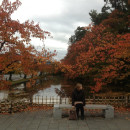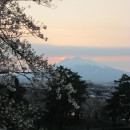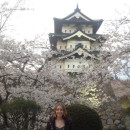Hirosaki: A place to truly immerse yourself in everyday Japanese culture Past Review
By Olivia D (Anthropology., University of Maine at Orono) - abroad from 10/01/2012 to 07/31/2013 with
Hirosaki University: Hirosaki - Direct Enrollment & Exchange
I can't praise my experience enough! It has changed me as a person and will likely influence all of my future goals. I'm not the same girl I was when I left my small hometown in Maine a year ago; I've seen China, Korea and several areas of Japan. At times it was terrifying but you learn to accept the scary with the adventure that ensues. The ability to handle any decision life throws your way becomes much easier after you've spent a year in a country where you can't even mail a letter without breaking out a dictionary. Every student I've come across since my return, I've encouraged to take the opportunity the University has given them to study abroad.
Review Photos





Personal Information
| How much international exposure did you have prior to this program? | 0-2 weeks |
Review Your Program
|
* Overall educational experience
Academic rigor, intensity, resources, etc. |
Depending on which Japanese level you're placed in, you'll either have language class everyday or as few times as twice a week. The lower levels are relatively stress free but move at a fast pace. The upper levels were more rigorous, with all texts being in Japanese and tests more difficult than one might expect. The culture classes are much less intensive and held once a week. They are taught bilingually and usually a single paper or test is used to evaluate your grade at the end of the term. While this may seem easy, each student is required to take a minimum of seven classes per semester. Most of the Japanese classes count toward this but those attending UMaine must have 15 credit hours rather than just seven classes. Because each class is worth about 2 credits, it means UMaine students have a heavier load than others. This can become stressful when you're faced with finals for 11 or so classes. |
|
* Host Country Program Administration
On-site administration of your program |
While the staff of the International Exchange Center at Hirosaki University would never hesitate to help you with any problem you may have, the process isn't alway made easy for international students. It may be due in part to the Japanese' bureaucracy system and its love of paperwork but tasks such as receiving a signature or enrollment confirmation sometimes take longer than most would think necessary. Also, while some of the teachers working within the International Program speak English, they are not always present. This makes it hard for those with very little experience speaking Japanese to communicate with the staff efficiently. While this is a good immersion method, it can cause confusion when dealing with important matters. |
|
* Housing:
How satisfied were you with your living arrangements? |
As those Hirosaki Alumni familiar with the "Kaikan" would agree, the living arrangements provided are very generous. Each student residing in the International Dorm is given their own room complete with bed, bathroom and kitchenette at a reduced cost of about $60 a month. That being said, the winters are very harsh and require students to heat their rooms by means of a gas heater or self-bought electric heater. This can cause utilities to run very high, paying anywhere from $50-$100 a month to properly heat your room. As is the case with most Japanese buildings, central heating is not always utilized which means staying warm depends on how much money you're willing to spend. Other than that, the building has everything you might need including coin laundry, a lobby, mail services and not to mention a nice balcony for every room! |
| * Food: |
Hirosaki is bursting with local restaurants, showcasing both local and traditional cuisine. They also have a nice variety of foreign food joints, such as Korean and Indian restaurants. There are ramen shops aplenty, my two favorites being "Bunpuku Ramen" located in front of the school and "Kumakichii" characterized by the yellow bear statue situated in front of the shop. The best restaurants can be tricky to find in Hirosaki. Often times they're situated down random alleyways or lack the "Wow!" factor that fancier establishments have. The most delicious and affordable places were the ones I discovered right before my program ended! The University has a cafeteria with a decent selection and you can always buy a quick lunch at a convenience store, located on almost every block. |
|
* Social & Cultural Integration:
How integrated did you feel with the local culture? |
Not many people are familiar with the Tohoku region in which Hirosaki is located. There is an abundance of culture and festivals international students can watch and even participate in. The region, often times called "Tsugaru", is home to one of the largest festivals in Japan and most renowned Cherry Blossom Viewing in the country. The "Neputa" lantern festival attracts thousands of tourists every year, along with other variations that are conducted in neighboring cities. I would also suggest seeing the "Kanto" Festival that is held in Akita City, a three hour drive from Hirosaki. Hirosaki Castle Park has a festival for every season; a must see for any visitor in the area. The University sets up several programs that allow students to take field trips emphasizing the regional culture along with delving into the history, crafts, and folklore of the native people. |
|
* Health Care:
How well were health issues addressed during the program? |
International Students are required to purchase the national healthcare plan. If you are already covered, this seems like an unnecessary expense but can't be avoided. It costs about $200 for the 11 months students study in Japan. |
| * Safety: |
Japan is famous for its safe cities with Hirosaki being no exception. I saw children no older than six walking to and from school on their own without any problem. During my time in Hirosaki I never felt unsafe, even when walking by myself at night. It seems the only job the police have is checking if bikes are stolen. |
| If you could do it all over again would you choose the same program? |
Yes
|
Finances
|
* Money: How easily were you able to live on a student's budget?
(1 = not very easy/$200+ on food & personal expenses/week, 2.5 = $100/week, 5 = very easily/minimal cost) |
If you are really trying to save money, it can be quite easy. Keeping utilities low and not eating out a lot will save you a lot of money. That being said, keeping warm in the winter is costly and difficult. Also, food in Japan is more expensive than in the United States. On top of that, portion sizes are very small while maintaining the expensive cost. Try to shop bargains: 100 yen eggs are sold ever Wednesday and Saturday at the UMart! |
| Not including program expenses, about how much money did you spend on food and other expenses each week? | I probably spent about $50 on food a week. Granted, I wasn't a fan of cooking which meant I ate out a lot. Most people walk or bike everywhere so transportation costs are minimal. Overall, I spent about $70 a week. |
| Do you have any general money-saving tips for future study abroad participants? | Keep utilities low and try not to eat at a restaurants everyday. I would advise not using the room's gas heater. Instead you should invest in a small electric heater and a heavy futon. |
Language
| * Did your program have a foreign language component? | Yes |
|
How much did the program encourage you to use the language?
0 = No encouragement, 5 = frequent encouragement to use the language |
If the student wants to improve their language ability, it's completely their responsibility. Since several of the teachers speak English, students can communicate to them easily. However, these teachers also speak Japanese which is an opportunity to practice. Japanese students also frequent the International Exchange Center quite often which is another chance to make friends. It's up to the student how much they want to take advantage of these opportunities. I saw several students who didn't take the time to acknowledge this and as a result, their language skills didn't improve. |
| How would you rate your language skills at the beginning of the program? | Beginner |
| How would you rate your language skills at the end of the program? | Intermediate |
| What was the highest level language course you had completed prior to departure? | I had completed the basic level but had very little speaking practice or rigorous grading procedures. I was consequently placed in the lowest level upon taking the placement test. However, because of my eagerness to learn and improve, I was able to skip the second level and entered the Intermediate class. |
| How many hours per day did you use the language? | |
| Do you have any tips/advice on the best ways to practice the language for future study abroad participants? | To be honest, I'm not sure of anyway a student looking to study abroad can prepare themselves for the experience. Even though I watched Japanese shows and dramas along with studying at my job the summer prior to my departure, I was still leagues away from being fluent. Searching out exchange students studying at your own University who are from the country you wish to study at is the best options. Once in your host country, as most study abroad alumni will say, make friends with the natives! Join clubs and interact! One of my biggest regrets is not joining school activities such as clubs. Because the international students take classes completely separately from the Japanese students, it can be hard to make friends. There are certain on-campus groups, such as the CCC, that are very welcoming to foreigners. The Japanese people can be very shy which makes it hard to connect to them, but if you do your best to communicate, I'm sure you'll be fine. Even while I say this, I wouldn't suggest writing off the other international students. I have made some life-changing friends during my time in Hirosaki, and most of them were other International students. They are part of why I enjoyed my experience so much and will never forget them! |
Other Program Information
|
* Where did you live?
Select all that apply |
|
|
* Who did you live with?
Select all that apply |
|
|
* Who did you take classes with?
Select all that apply |
|
| About how many local friends did you make that you will likely keep in touch with? |
A Look Back
| * What did you like most about the program? |
|
| * What could be improved? |
|
| * What do you know now that you wish you knew before going on this program? | Even as a Maine native, I'd have to say Hirosaki's winters are more severe. It snows everyday starting in late November and students have no choice but to walk to school. The buildings are also poorly heated, with everyone roaming the hallways in full-blown winter getup, complete with gloves and scarves. Students should be aware of this and pack accordingly. Also, while not a major issue, the Tsugaru region is famous for its impossible dialect. If you get in a cab and give the driver directions in Japanese, don't feel bad if you can't understand his response. It's likely he'll speak in this dialect, an accent even native Japanese people need subtitles to understand. Other than that, just know that you WILL make mistakes but try to think of it as a learning experience. I personally experienced mild embarrassment when I attempted to say a child "looked cute" when my poor Japanese caused me to say he "looks pitiful" instead. The mistake lead to a boat of laughter from my friends but it's safe to say I definitely learned the correct phrasing after that. Don't be discouraged and do your best to take advantage of the opportunity!! |
Reasons For Studying Abroad
| To help future students find programs attended by like-minded individuals, please choose the profile that most closely represents you. |
The NetworkerAn active student leader, it was important for you to network abroad as well. Once overseas, you sought out student clubs, volunteered with local organizations, or attended community events. You encouraged your friends join you, and often considered how you could reflect your international experiences in a resume. |








